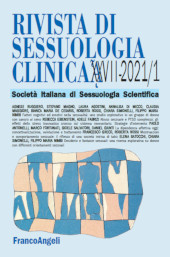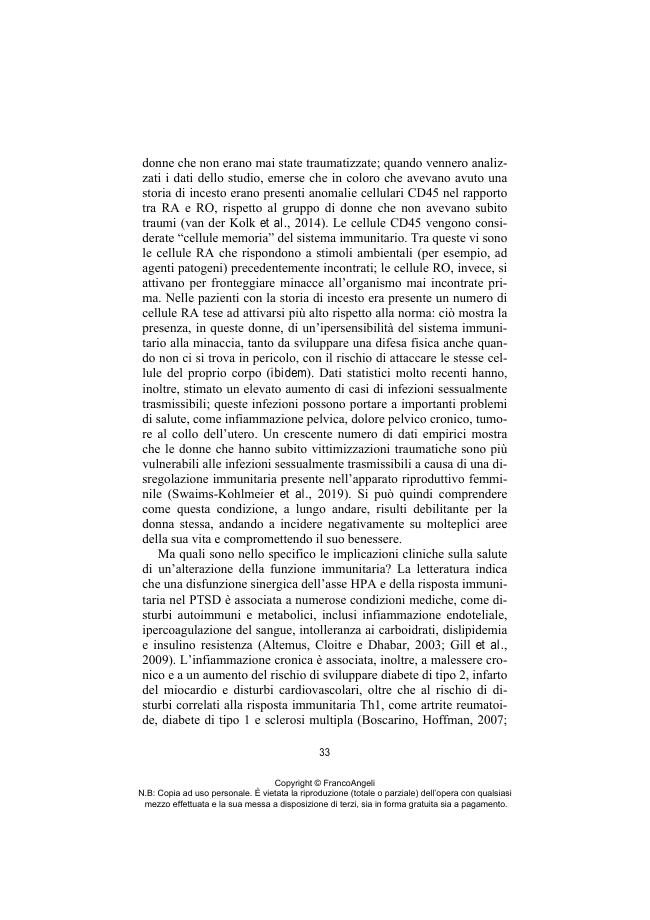Abuso sessuale e PTSD complesso : gli effetti dello stress traumatico cronico sul sistema immunitario : strategie d'intervento
23-43 p.
Il lavoro presenta le principali caratteristiche del PTSD complesso nel contesto dell'abuso sessuale e l'impatto che questo disturbo e la condizione di stress cronico ad esso associata può avere sulla persona traumatizzata, in particolar modo sul sistema immunitario. Una caratteristica importante del sistema immunitario è la sua capacità di reagire in modo differente in base allo stimolo specifico, ma anche la capacità di apprendimento e di memoria, mostrando come questo sistema si strutturi fondamentalmente in rapporto con l'ambiente. È sempre più evidente che le diverse modalità di risposta del sistema immunitario non dipendono solo dal tipo di stimolo (ad esempio, virus, batteri), ma anche dal microambiente e dalle condizioni generali dell'organismo, dunque anche dallo stress psicologico. È chiaro, pertanto, come il sistema immunitario sia in grado di interagire con il sistema nervoso e quindi con i fenomeni mentali e relazionali.
Lo stress psichico di tipo cronico che si osserva in coloro che hanno subito un trauma cumulativo interpersonale può quindi costituire un importante fattore di disfunzione del sistema immunitario, con un'alterata risposta che è alla base di molte patologie in cui il sistema immunitario svolge un ruolo cruciale. Oltre a ciò, nelle persone vittime di abuso è stato rilevato uno sfasamento del sistema nervoso autonomo, per cui risultano essere iperattivate da un sistema viscerale che invia loro un continuo segnale di pericolo. Questa condizione ha importanti ripercussioni anche sulla capacità interattiva e sociale, con un grave impatto sul benessere psicofisico della persona.
Per questo motivo, è necessario sviluppare interventi basati su un approccio multidisciplinare e biopsicosociale che aiutino le persone traumatizzate a risintonizzare la regolazione autonomica per favorire la fiducia e un coinvolgimento sociale spontaneo, e ad elaborare le componenti emotive e somatiche dell'esperienza traumatica. [Testo dell'editore].
This paper shows the main features of complex PTSD in the context of sexual abuse and the impact that this disease, with the consequent chronic stress condition, may have on the traumatized patient, in particular on the immune system. The immune system has the ability to react in different ways to different stimuli. Moreover, learning and memory ability are demonstrated, showing how this system is intrinsecally connected to the environment. There is a growing evidence that the different response patterns of the immune system do not depend only on the type of stimulus (for example, virus, bacteria), but also on the microenvironment and on the general condition of the whole physiology, and therefore on the psychological stress too. Thus, it is clear how the immune system is able to interact with the nervous system and consequently with mental and relational phenomena.
The chronic psychological stress observed in those who have suffered by cumulative interpersonal trauma may be considered an important factor with a negative effect on the immune system function and may lead to a dysregulation of the immune response that is the basis of many pathologies in which the immune system has a key role. Furthermore, a shift in the autonomic nervous system of victims exposed to sexual abuse has been detected, so that they have an hyperactivated visceral system that sends a continuous threatening feedback. This condition also has severe consequences on interactive and social capabilities, with a severe impact on the psychophysical wellbeing of the person. For this reason, it is necessary to develop interventions based on a multidisciplinary and biopsychosocial approach that could help the traumatized people both to retune autonomic state to enable spontaneus social engagement and trust, and to heal the emotional and somatic components of the traumatic experience. [Publisher's text].
Fait partie de
Rivista di sessuologia clinica : 1, 2021-
Articles du même numéro (disponibles individuellement)
-
Informations
Code DOI : 10.3280/RSC2021-001002
ISSN: 1972-5183
DISCIPLINES
KEYWORDS
- PTSD complesso, stress cronico, abuso sessuale, immunità, disregolazione immunitaria, infiammazione
- complex PTSD, chronic stress, sexual abuse, immunity, immune disfunction, inflammation



